|
1. Williams Admits Bias, Discovers Opposition to Illegal Immigration
NBC Nightly News anchor Brian Williams conceded on Thursday's newscast that NBC has focused on the interests of those in favor of the immigration bill as he acknowledged "a lot of people" have a different perspective. A week after the immigration bill collapsed in the Senate, NBC got around to the other side -- but that's still sooner than ABC or CBS. With "Immigration Backlash" on screen, Williams explained how "as we have covered the immigration debate here, we have heard from numerous Americans who are trying to run businesses, make money and in some cases bring in ripe crops. They've been begging lawmakers for a workable immigration solution. A lot of people think this country is letting too many people in. Tonight we hear their take on immigration." David Gregory narrated video from North Carolina as he relayed how "a retired schoolteacher complains the reform plan ignores the steady flow of illegal immigrants" Gregory realized that "the anger in North Carolina is being felt around the country and it has created a nearly-unprecedented grassroots movement dedicated to defeating the immigration measure."
2. Only NBC Nightly News Squeezes in Mention of Flag Day
Of the three broadcast network evening newscasts on Thursday, only the NBC Nightly News mentioned that it was Flag Day. But not until the very last seconds after the final story. Then Brian Williams observed as he closed his program: "That's our broadcast for this Thursday night, which also happens to be Flag Day. Thank you for being with us. I'm Brian Williams. We'll look for you right back here tomorrow evening. As we leave you tonight, a look at this Flag Day 2007 across our country. Good night."
3. Nightline Gives Moore Platform to Tout 'Artistic Freedom' of Cuba
Filmmaker Michael Moore's appearance on Wednesday's edition of Nightline wrapped up a two-day tour of ABC News programs. Between Nightline and Good Morning America, the network gave the outspoken leftist almost 21 and a half minutes of air time to promote his new health care documentary, Sicko. Nightline co-anchor Terry Moran offered a generally friendly interview as he earnestly asserted how audiences would see a softer, "different" Michael Moore: "But there's something different about this Michael Moore movie. For all the laughs, it's very serious and laced with qualities not usually associated with his films: Pity, compassion, generosity, sorrow." Moran also saw a religious quest: "He kept making the same point. The point his movie ultimately makes. Fixing health care is a moral, even a religious obligation." Moran prompted the lefty director as to whether he'd consider running for political office: "Seriously. You got a pretty good name recognition out there. A lot of people who agree with you. It looks like you enjoy it out there. Would you do it?" For the most part, the ABC host only challenged the filmmaker when he made truly outrageous comments, such as asserting that Cuba is a country of "artistic freedom."
 Williams Admits Bias, Discovers Opposition Williams Admits Bias, Discovers Opposition
to Illegal Immigration
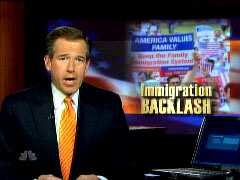 NBC Nightly News anchor Brian Williams conceded on Thursday's newscast that NBC has focused on the interests of those in favor of the immigration bill as he acknowledged "a lot of people" have a different perspective. A week after the immigration bill collapsed in the Senate, NBC got around to the other side -- but that's still sooner than ABC or CBS. With "Immigration Backlash" on screen, Williams explained how "as we have covered the immigration debate here, we have heard from numerous Americans who are trying to run businesses, make money and in some cases bring in ripe crops. They've been begging lawmakers for a workable immigration solution. A lot of people think this country is letting too many people in. Tonight we hear their take on immigration."
NBC Nightly News anchor Brian Williams conceded on Thursday's newscast that NBC has focused on the interests of those in favor of the immigration bill as he acknowledged "a lot of people" have a different perspective. A week after the immigration bill collapsed in the Senate, NBC got around to the other side -- but that's still sooner than ABC or CBS. With "Immigration Backlash" on screen, Williams explained how "as we have covered the immigration debate here, we have heard from numerous Americans who are trying to run businesses, make money and in some cases bring in ripe crops. They've been begging lawmakers for a workable immigration solution. A lot of people think this country is letting too many people in. Tonight we hear their take on immigration."
In the subsequent report, David Gregory narrated video from North Carolina as he relayed how "a retired schoolteacher complains the reform plan ignores the steady flow of illegal immigrants" Gregory realized that "the anger in North Carolina is being felt around the country and it has created a nearly-unprecedented grassroots movement dedicated to defeating the immigration measure." He characterized the view as part of "an anti-immigration assault" fueled by "opponents of the immigration bill who claim it's nothing more than amnesty for law breakers." But he then cited opposition to all immigration: "The issue cuts across party lines. The latest NBC News/Wall Street Journal poll found that 50 percent of Republicans, 41 percent of independents, and 40 percent of Democrats think immigration hurts more than it helps."
[This item was posted Thursday night on the MRC's blog, NewsBusters.org: newsbusters.org ]
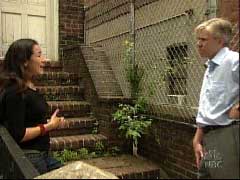 A year ago, the June 6, 2006 NBC Nightly News ran a piece from Gregory which looked at the immigration debate through the prism of illegals in Queens: "You see a neighborhood among the most diverse in the city on the leading edge of this fight. Some are afraid. Luis Amigo owns this bodaga. Here illegally, he says he won't visit his sister anymore, fearing he'll now get stuck in Mexico." Gregory set up "community activist" Ana Maria Archilla: "Leaving really isn't an option?" And before a minister, who didn't differentiate between legal and illegal immigrants, argued that "we would fail our forefathers if we are not doing what we are supposed to do, to welcome immigrants," Gregory delivered this chastisement of conservatives, "There is also this appeal: Don't let today's politics change the country."
A year ago, the June 6, 2006 NBC Nightly News ran a piece from Gregory which looked at the immigration debate through the prism of illegals in Queens: "You see a neighborhood among the most diverse in the city on the leading edge of this fight. Some are afraid. Luis Amigo owns this bodaga. Here illegally, he says he won't visit his sister anymore, fearing he'll now get stuck in Mexico." Gregory set up "community activist" Ana Maria Archilla: "Leaving really isn't an option?" And before a minister, who didn't differentiate between legal and illegal immigrants, argued that "we would fail our forefathers if we are not doing what we are supposed to do, to welcome immigrants," Gregory delivered this chastisement of conservatives, "There is also this appeal: Don't let today's politics change the country."
For a full rundown, scroll down to the second half of this CyberAlert item: www.mrc.org
On Monday, the MRC distributed a Media Reality Check by Rich Noyes, "TV's Paltry, Left-Leaning Immigration News; MRC Study: After Celebrating Immigration Bill's Debut, ABC, CBS and NBC Mostly Ignored the Debate." Noyes noted:
The costs of illegal immigration were mentioned just twice. In his May 22 commentary on CBS's Early Show, Lou Dobbs revealed how "Robert Rector of the Heritage Foundation estimates the net cost to our government and taxpayers could be more than $2.5 trillion over the next two decades." The only network news report on the subject came May 27, when NBC Nightly News reporter Robert Bazell used a small hospital in Arizona, as a case study: "The cost of treating non-citizens forced the Copper Queen [Hospital] to close its obstetrics unit....Nation-wide, undocumented immigrants cost the nation $6 billion a year for health care."
The caveat: May 27 was a Sunday, a night when Williams does not anchor.
For the June 11 Media Reality Check: www.mrc.org
A transcript of the June 14 NBC Nightly News story:
BRIAN WILLIAMS: The President today appealed once again for passage of that immigration deal in Washington and while they're still talking tonight, nothing has revived it since its collapse. As we have covered the immigration debate here, we have heard from numerous Americans who are trying to run businesses, make money and in some cases bring in ripe crops. They've been begging lawmakers for a workable immigration solution. A lot of people think this country is letting too many people in. Tonight we hear their take on immigration from NBC's David Gregory.
DAVID GREGORY: The rolling hills of North Carolina are nowhere near America's southern border, but even here feelings about immigration run red-hot. 64-year-old Beth Thomas, a retired schoolteacher, complains the reform plan ignores the steady flow of illegal immigrants.
BETH THOMAS: There is a way to come here through the legal channels, but just to cross our borders, break our laws is not the way to do it.
GREGORY: North Carolina has seen its Hispanic population increase almost 50 percent in five years. Many have come for construction jobs. Ray Faseola (sp?) moved to North Carolina from San Diego, where he blamed illegal immigration for overcrowding the schools. Now he says it's happening here.
RAY FASEOLA: They have to build new schools, they have to build onto the hospitals because they're taxing everything. The illegal immigrants here get it for free.
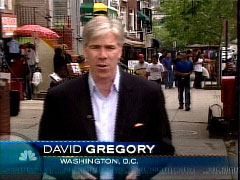 GREGORY: The anger in North Carolina is being felt around the country and it has created a nearly-unprecedented grassroots movement dedicated to defeating the immigration measure now being debated here in Washington. GREGORY: The anger in North Carolina is being felt around the country and it has created a nearly-unprecedented grassroots movement dedicated to defeating the immigration measure now being debated here in Washington.
LOU DOBBS ON CNN: What I am worried about is people in this government don't know what they're talking about.
RADIO TALK SHOW HOST ON KOA IN DENVER: I'm a Republican, I want tough immigration reform.
WOMAN IN TV AD: Where's the fence?
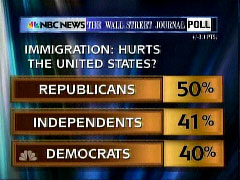 GREGORY: Fueling the fire, an anti-immigration assault. Opponents of the immigration bill who claim it's nothing more than amnesty for law breakers. The issue cuts across party lines. The latest NBC News/Wall Street Journal poll found that 50 percent of Republicans, 41 percent of independents, and 40 percent of Democrats think immigration hurts more than it helps. Driving those numbers, say experts, the fact that illegal immigrants have moved beyond the border states to new communities. GREGORY: Fueling the fire, an anti-immigration assault. Opponents of the immigration bill who claim it's nothing more than amnesty for law breakers. The issue cuts across party lines. The latest NBC News/Wall Street Journal poll found that 50 percent of Republicans, 41 percent of independents, and 40 percent of Democrats think immigration hurts more than it helps. Driving those numbers, say experts, the fact that illegal immigrants have moved beyond the border states to new communities.
DORIS MEISSNER, MIGRATION POLICY INSTITUTE: They're experiencing immigration in a way that is new to them. They see their communities changing, they see their schools changing and they see that very many of the people around them are here illegally.
GREGORY: A nation of immigrants divided over the question of who belongs. David Gregory, NBC News, Washington.
  Only NBC Nightly News Squeezes in Mention Only NBC Nightly News Squeezes in Mention
of Flag Day
 Of the three broadcast network evening newscasts on Thursday, only the NBC Nightly News mentioned that it was Flag Day. But not until the very last seconds after the final story. Then Brian Williams observed as he closed his program: "That's our broadcast for this Thursday night, which also happens to be Flag Day. Thank you for being with us. I'm Brian Williams. We'll look for you right back here tomorrow evening. As we leave you tonight, a look at this Flag Day 2007 across our country. Good night."
Of the three broadcast network evening newscasts on Thursday, only the NBC Nightly News mentioned that it was Flag Day. But not until the very last seconds after the final story. Then Brian Williams observed as he closed his program: "That's our broadcast for this Thursday night, which also happens to be Flag Day. Thank you for being with us. I'm Brian Williams. We'll look for you right back here tomorrow evening. As we leave you tonight, a look at this Flag Day 2007 across our country. Good night."
As Williams spoke, and continuing for a few more seconds beyond that, for 25 seconds in all viewers saw video of the flag over the Iwo Jima memorial in Arlington, Virginia followed by the flags around the Washington Monument in Washington, DC.
[This item was posted late Thursday night on the MRC's blog, NewsBusters.org: newsbusters.org ]
  Nightline Gives Moore Platform to Tout Nightline Gives Moore Platform to Tout
'Artistic Freedom' of Cuba
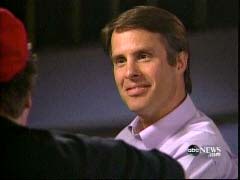 Far-left filmmaker Michael Moore's appearance on Wednesday's edition of Nightline wrapped up a two-day tour of ABC News programs. Between Nightline and Good Morning America, the network gave the outspoken leftist almost 21 and a half minutes of air time to promote his new health care documentary, Sicko. Nightline co-anchor Terry Moran offered a generally friendly interview as he earnestly asserted how audiences would see a softer, "different" Michael Moore: "But there's something different about this Michael Moore movie. For all the laughs, it's very serious and laced with qualities not usually associated with his films: Pity, compassion, generosity, sorrow." Moran also saw a religious quest: "He kept making the same point. The point his movie ultimately makes. Fixing health care is a moral, even a religious obligation."
Far-left filmmaker Michael Moore's appearance on Wednesday's edition of Nightline wrapped up a two-day tour of ABC News programs. Between Nightline and Good Morning America, the network gave the outspoken leftist almost 21 and a half minutes of air time to promote his new health care documentary, Sicko. Nightline co-anchor Terry Moran offered a generally friendly interview as he earnestly asserted how audiences would see a softer, "different" Michael Moore: "But there's something different about this Michael Moore movie. For all the laughs, it's very serious and laced with qualities not usually associated with his films: Pity, compassion, generosity, sorrow." Moran also saw a religious quest: "He kept making the same point. The point his movie ultimately makes. Fixing health care is a moral, even a religious obligation."
Moran prompted the lefty director as to whether he'd consider running for political office: "Seriously. You got a pretty good name recognition out there. A lot of people who agree with you. It looks like you enjoy it out there. Would you do it?"
For the most part, the ABC host only challenged the filmmaker when he made truly outrageous comments, such as asserting that Cuba is a country of "artistic freedom": "They have an excellent health care system, probably the best in the Third World. There is not religious persecution. There's artistic freedom. I went-" Moran: "There's artistic freedom in Cuba?" Moore: "Oh, yeah. I hung out with artists who are critical of Castro and, and, and very freely speak their minds." At this point, Moran apparently felt the need to point out that "Human rights groups like Amnesty International say Cuba continues to repress nearly all forms of dissent."
Towards the end of the two part segment, the Nightline anchor did slightly challenge Moore. Moran asked the director if he believed that Canadians and Britons would say they live in a "health care paradise." Additionally, the ABC host confirmed that France and Canada pay extremely high taxes and "many people in those countries are deeply dissatisfied with their systems."
[This item is adapted from a posting, by Scott Whitlock, on the MRC's NewsBusters blog: newsbusters.org ]
For rundowns of the platform ABC gave Moore on GMA, see the June 13 CyberAlert item, "ABC's GMA Gives Forum to Moore to Denounce U.S. Health System," online at: www.mrc.org
And the June 14 CyberAlert article, "Masochistic ABC Touts Moore: 'Media Complicit' in Troop Deaths," online at: www.mrc.org
A partial transcript of the June 13 Nightline segment:
Terry Moran: "Good evening. I'm Terry Moran. Michael Moore is back. And this time, the firebrand filmmaker has pointed his critical lens directly at the American health care system with a new movie called Sicko. And as with his previous documentaries, including the blockbuster Fahrenheit 9/11, Moore has a specific and very aggressive agenda. But this time, beyond the signature traits of sarcasm and surprise. Michael Moore shows a different side in this movie. It was a side he also revealed when I spent the day with him yesterday, in Sacramento, California. You know Michael Moore. Or maybe you think you do."
Michael Moore: "They don't usually let me into places like this."
Moran: "Sure, he's the gadfly documentary filmmaker who attacks big corporations and the Republican Party with a rare populist glee in his movies and public appearances. And this time, he's after the health care industry."
Moore: "That's the only pre-existing condition, that should exist. I am an American. That's it."
Moran: "And, yes, Michael Moore is a kind of public brawler."
Moore: "They want to be able to go to the doctor!"
Moran: "Remember when he seized his moment at the Oscars in 2003, just days after the start of the Iraq War, to bash President Bush and outrage millions of Americans."
[Clip from Oscars]
Moran: "And in his new movie, Sicko, Moore is, in many ways, true to form. Taking on America's deeply-flawed health care system, with brash humor and passionate advocacy."
Moore [from Sicko]: "Four health care lobbyists for every member of Congress. And the United States slipped to 37 in health care around the world. Just slightly ahead of Slovenia."
Moran: "But there's something different about this Michael Moore movie. For all the laughs, it's very serious. And laced with qualities not usually associated with his films: Pity, compassion, generosity, sorrow."
Moore: "I think that perhaps in the past, I haven't done a very good job of showing the entire me. And all those things are very much a part of me."
Moran: "Yesterday, we spent a long day with Michael Moore, in Sacramento, California. He was there, in part, to lobby legislators on health care. And he kept making the same point. The point his movie ultimately makes. Fixing health care is a moral, even a religious obligation."
Moore: "What they taught us, if those of you remember, and you don't have to Catholic either to know this is that, is that when Jesus was asked, 'How do you get into Heaven?' He said, 'Well, when you come to the Pearly gates, you're going to be asked a few questions. I'm going to ask you, when I was hungry, did you feed me? When I was homeless, did you give me shelter?'"
Moran: "Is Sicko kind of a statement of faith for you?"
Moore: "Yeah. It is, in a way. I'm not a proselytizer. I don't like putting my religious beliefs, or whatever, out there. But I do, I do believe that this film is coming from a very deep place and a very spiritual place, in the sense that I believe, as a Christian, as a Catholic, that it's my responsibility to make sure that, that not only that I'm covered, if something happens to me, but everyone else is covered."
Moran: "And the source of that feeling is, in part, religious for you? It's part of your faith?"
Moore: "It is. I mean, yes. Absolutely."
Moran: "That would surprise people."
Moore: "Yeah. I wonder why. You know, I went to the seminary to be a priest."
Moran: "No."
Moore: "Yeah. Yes. I convinced my parents to let me leave home in high school because I wanted to spend my life, devote my life, to helping people."
Moran: "Father Michael Moore. Hard to imagine, maybe. Or maybe not. Well, try this one. Senator Michael Moore. Everywhere we went, there was an unmistakable political energy to our day in California with Moore. His first stop, a meeting with powerful California Democrats, who are pushing a bill to dramatically expand access to health care in the state. And they treated him less like a movie maker, than a powerful political activist, which he is. Why did you call this meeting? What difference do you think it will make? Do you think a movie can make a difference?"
Unidentified California Democrat: "It's very important. You know, his presence here is huge. And we couldn't be more grateful."
Moran: "Next stop, a press conference in the capital, where Moore sounded very much at home."
Moore: "My own personal feelings. And, you know, I'm not here. I'm not a legislator. I'm not writing bills. Not doing any of this. Well, I don't know about that."
Moran: "Then, it was off through throngs of supporters, just like a campaign, to testify at a hearing on health care. Did you expect this much intense attention?"
Moore: "No. You know, I haven't been on television until just, like, this week, for, like, two and a half years. I mean, I purposely have not done any interviews. Haven't done anything like that."
Moran: "Moore actually once held political office, when he was 18. He served on the local school board. And he doesn't rule out the possibility he might try it again. Would you run for political office again?"
Moore: "No. I retired when I was 22. I served four years on that board of education and I can't imagine doing anything like that."
Moran: "Seriously. You got pretty good name recognition out there. A lot of people who agree with you. It looks like you enjoy it out there. Would you do it?"
Moore: "Well, let's just see if continue to see if I eat the fruits and vegetables and walking around the block. Nobody like this should be running for public office. It's a bad, bad example to set for the children."
....
Moran: "And now, some more of my day with filmmaker Michael Moore in Sacramento, California and his new movie about the American health care system, Sicko. What Michael Moore does in Sicko is what he always does in his movies: Take aim at what he considers injustice."
[Brief Sicko clip]
Moran: "Moore's solution, free, universal health care. A system he describes in glowing, utopian terms by visiting Canada, Britain and France, never mentioning that many people in those countries are deeply dissatisfied with their systems. You think Canadians and Britons and the French would actually say, 'Michael Moore has got it right. We live in a health care paradise.'?"
Moore: "I don't know if they'd say health care paradise. But here's what I know what they'd say: 'We would never trade our health insurance card for your Blue Cross card, or your Aetna card, or you Humana card.'"
Moran: "Moore's critics, and there are a lot of them, say he distorts the truth to make his points. They have also gotten personal, sniping about his weight, saying, a man so unhealthy should not complain about health care."
....
Moran: "Moore traveled to Cuba with three 9/11 rescue workers who are now sick and unable to pay for care. His first stop, Guantanamo Bay, where the Bush administration claims al Qaeda detainees are getting top-notch care."
Moore [Sicko clip]: "I have three 9/11 rescue workers. They just want some medical attention. The same kind that the evil doers are getting. Hello?"
Moran: "He ended up in Havana, where Cuban doctors treated the Americans."
Moore: "They have an excellent health care system, probably the best in the Third World. There is not religious persecution. There's artistic freedom. I went-"
Moran: "There's artistic freedom in Cuba?"
Moore: "Oh, yeah. I hung out with artists who are critical of Castro and, and, and very freely speak their minds."
Moran: "Human rights groups like Amnesty International say Cuba continues to repress nearly all forms of dissent."
-- Brent Baker

Home | News Division
| Bozell Columns | CyberAlerts
Media Reality Check | Notable Quotables | Contact
the MRC | Subscribe
|




















 NBC Nightly News anchor Brian Williams conceded on Thursday's newscast that NBC has focused on the interests of those in favor of the immigration bill as he acknowledged "a lot of people" have a different perspective. A week after the immigration bill collapsed in the Senate, NBC got around to the other side -- but that's still sooner than ABC or CBS. With "Immigration Backlash" on screen, Williams explained how "as we have covered the immigration debate here, we have heard from numerous Americans who are trying to run businesses, make money and in some cases bring in ripe crops. They've been begging lawmakers for a workable immigration solution. A lot of people think this country is letting too many people in. Tonight we hear their take on immigration."
NBC Nightly News anchor Brian Williams conceded on Thursday's newscast that NBC has focused on the interests of those in favor of the immigration bill as he acknowledged "a lot of people" have a different perspective. A week after the immigration bill collapsed in the Senate, NBC got around to the other side -- but that's still sooner than ABC or CBS. With "Immigration Backlash" on screen, Williams explained how "as we have covered the immigration debate here, we have heard from numerous Americans who are trying to run businesses, make money and in some cases bring in ripe crops. They've been begging lawmakers for a workable immigration solution. A lot of people think this country is letting too many people in. Tonight we hear their take on immigration."  A year ago, the June 6, 2006 NBC Nightly News ran a piece from Gregory which looked at the immigration debate through the prism of illegals in Queens: "You see a neighborhood among the most diverse in the city on the leading edge of this fight. Some are afraid. Luis Amigo owns this bodaga. Here illegally, he says he won't visit his sister anymore, fearing he'll now get stuck in Mexico." Gregory set up "community activist" Ana Maria Archilla: "Leaving really isn't an option?" And before a minister, who didn't differentiate between legal and illegal immigrants, argued that "we would fail our forefathers if we are not doing what we are supposed to do, to welcome immigrants," Gregory delivered this chastisement of conservatives, "There is also this appeal: Don't let today's politics change the country."
A year ago, the June 6, 2006 NBC Nightly News ran a piece from Gregory which looked at the immigration debate through the prism of illegals in Queens: "You see a neighborhood among the most diverse in the city on the leading edge of this fight. Some are afraid. Luis Amigo owns this bodaga. Here illegally, he says he won't visit his sister anymore, fearing he'll now get stuck in Mexico." Gregory set up "community activist" Ana Maria Archilla: "Leaving really isn't an option?" And before a minister, who didn't differentiate between legal and illegal immigrants, argued that "we would fail our forefathers if we are not doing what we are supposed to do, to welcome immigrants," Gregory delivered this chastisement of conservatives, "There is also this appeal: Don't let today's politics change the country."  GREGORY: The anger in North Carolina is being felt around the country and it has created a nearly-unprecedented grassroots movement dedicated to defeating the immigration measure now being debated here in Washington.
GREGORY: The anger in North Carolina is being felt around the country and it has created a nearly-unprecedented grassroots movement dedicated to defeating the immigration measure now being debated here in Washington.  GREGORY: Fueling the fire, an anti-immigration assault. Opponents of the immigration bill who claim it's nothing more than amnesty for law breakers. The issue cuts across party lines. The latest NBC News/Wall Street Journal poll found that 50 percent of Republicans, 41 percent of independents, and 40 percent of Democrats think immigration hurts more than it helps. Driving those numbers, say experts, the fact that illegal immigrants have moved beyond the border states to new communities.
GREGORY: Fueling the fire, an anti-immigration assault. Opponents of the immigration bill who claim it's nothing more than amnesty for law breakers. The issue cuts across party lines. The latest NBC News/Wall Street Journal poll found that 50 percent of Republicans, 41 percent of independents, and 40 percent of Democrats think immigration hurts more than it helps. Driving those numbers, say experts, the fact that illegal immigrants have moved beyond the border states to new communities. 
 Of the three broadcast network evening newscasts on Thursday, only the NBC Nightly News mentioned that it was Flag Day. But not until the very last seconds after the final story. Then Brian Williams observed as he closed his program: "That's our broadcast for this Thursday night, which also happens to be Flag Day. Thank you for being with us. I'm Brian Williams. We'll look for you right back here tomorrow evening. As we leave you tonight, a look at this Flag Day 2007 across our country. Good night."
Of the three broadcast network evening newscasts on Thursday, only the NBC Nightly News mentioned that it was Flag Day. But not until the very last seconds after the final story. Then Brian Williams observed as he closed his program: "That's our broadcast for this Thursday night, which also happens to be Flag Day. Thank you for being with us. I'm Brian Williams. We'll look for you right back here tomorrow evening. As we leave you tonight, a look at this Flag Day 2007 across our country. Good night." 
 Far-left filmmaker Michael Moore's appearance on Wednesday's edition of Nightline wrapped up a two-day tour of ABC News programs. Between Nightline and Good Morning America, the network gave the outspoken leftist almost 21 and a half minutes of air time to promote his new health care documentary, Sicko. Nightline co-anchor Terry Moran offered a generally friendly interview as he earnestly asserted how audiences would see a softer, "different" Michael Moore: "But there's something different about this Michael Moore movie. For all the laughs, it's very serious and laced with qualities not usually associated with his films: Pity, compassion, generosity, sorrow." Moran also saw a religious quest: "He kept making the same point. The point his movie ultimately makes. Fixing health care is a moral, even a religious obligation."
Far-left filmmaker Michael Moore's appearance on Wednesday's edition of Nightline wrapped up a two-day tour of ABC News programs. Between Nightline and Good Morning America, the network gave the outspoken leftist almost 21 and a half minutes of air time to promote his new health care documentary, Sicko. Nightline co-anchor Terry Moran offered a generally friendly interview as he earnestly asserted how audiences would see a softer, "different" Michael Moore: "But there's something different about this Michael Moore movie. For all the laughs, it's very serious and laced with qualities not usually associated with his films: Pity, compassion, generosity, sorrow." Moran also saw a religious quest: "He kept making the same point. The point his movie ultimately makes. Fixing health care is a moral, even a religious obligation."